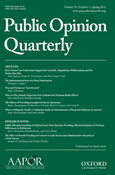-
Views
-
Cite
Cite
Thomas J. Leeper, The Informational Basis for Mass Polarization, Public Opinion Quarterly, Volume 78, Issue 1, Spring 2014, Pages 27–46, https://doi.org/10.1093/poq/nft045
Close - Share Icon Share
Abstract
If nothing else, democratic politics requires compromise. Mass polarization, where citizens disagree strongly and those disagreements magnify over time, presents obvious threats to democratic well-being. The overwhelming presumption is that if polarization is occurring, a substantial portion of it is attributable to the fragmentation attendant an increasingly choice-laden media environment where individuals expose themselves only to opinion-reinforcing information. Under what conditions does mass opinion polarization occur? Through two over-time laboratory experiments involving information choice behavior, this paper considers, first, the effects of slant in one’s information environment on over-time opinion dynamics and, second, the moderating role of attitude importance on those effects. The experiments reveal that, despite similar information search behavior, those with strong attitudes are dogmatic, resisting even substantial contrary evidence; those with weak attitudes, by contrast, hear opposing arguments and develop moderate opinions regardless of the prevalence of those arguments in their environment. Evaluations of information, rather than information search behavior per se, explain why individuals with strong attitudes polarize and those with weak attitudes do not. Polarization therefore seems to require more than media fragmentation and, in fact, a more important factor may be the strength of citizens’ prior attitudes on particular issues.





